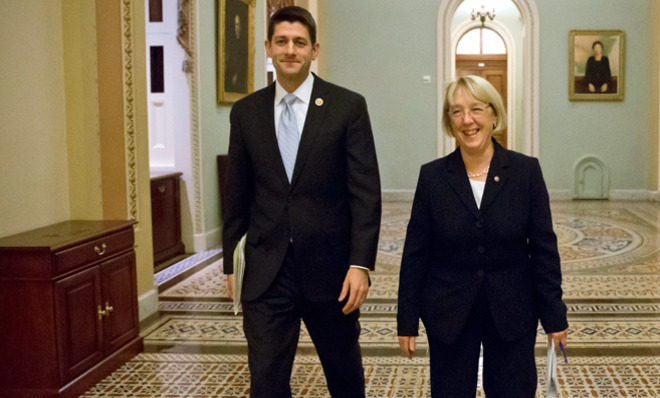What the budget deal means for the economy
Compromise is good, but another crisis may be just around the corner

A free daily email with the biggest news stories of the day – and the best features from TheWeek.com
You are now subscribed
Your newsletter sign-up was successful
Congressional negotiators have reached a budget agreement, with both sides saying it hopes the deal will eliminate the threat of another government shutdown in 2014. When it comes to the deal's potential impact on the economy at least, there is cause for optimism.
The deal brokered by Democratic Senator Patty Murray and Republican Congressman Paul Ryan would restore around $65 billion of the $85 billion in automatic spending cuts set to hit in 2014, spreading the funds to domestic and defense spending equally. Spending increases are to be funded by a variety of fees — including doubling the security fee paid by fliers — and other measures expected to raise around $85 billion in the next decade, cutting the budget deficit by $23 billion over that period.
The deal was immediately praised by House leaders, who hope to bring it to a vote as early as Thursday, despite grumblings from both sides of the aisle, including some irate Republicans who say the deal does too much to rollback sequester cuts.
The Week
Escape your echo chamber. Get the facts behind the news, plus analysis from multiple perspectives.

Sign up for The Week's Free Newsletters
From our morning news briefing to a weekly Good News Newsletter, get the best of The Week delivered directly to your inbox.
From our morning news briefing to a weekly Good News Newsletter, get the best of The Week delivered directly to your inbox.
Yet it remains quite unclear why spending cuts of any sort are necessary now. Interest rates on government borrowing remain far below their long-term average, meaning that the market is offering government the opportunity to invest in infrastructure and other long-term projects at a discount.
For his part, President Obama issued a statement labeling the agreement as "balanced" and "designed in a way that doesn't hurt our economy."
This is important.
Economists estimate that the 2013 sequester hurt the economy significantly. In February 2012 the Congressional Budget Office (CBO) warned that "in the absence of sequestration, CBO estimates GDP growth would be about 0.6 percentage points faster during [the 2013] calendar year, and the equivalent of about 750,000 more full-time jobs would be created or retained by the fourth quarter.”
A free daily email with the biggest news stories of the day – and the best features from TheWeek.com
And in February this year, Paul Krugman warned that the sequester would cost the economy 700,000 jobs.
Yet even with the sequester, the economy has been growing and adding jobs at a brisk clip, suggesting that the negative effects of the sequester have been offset by new growth elsewhere. Even so, a much smaller-than-expected 2014 sequester is reason for optimism — unemployment still remains relatively high, and the economy needs all the jobs it can get.
Better still is the prospect of ending — in the very near term, at least — Congress’ habit of veering from crisis to crisis, unsettling markets and investors along the way. The fact that the two parties could sit down and hammer out a deal suggests glimmers of compromise and conciliation. Even if the two sides came together only to avoid further shutdowns, uncertainty, and confusion, this is a breakthrough worth celebrating.
Yet, there are causes for concern: An extension to unemployment benefits was left out of this deal, meaning negotiators will have to hash something out before relief to the long-term unemployed runs out on December 28. And while a budget has been reached, the government’s statutory borrowing authority will lapse as early as March 2014, meaning that another potential showdown looms just around the corner. This uncertainty could be avoided, however, by abolishing the debt ceiling as Australia has recently done.
John Aziz is the economics and business correspondent at TheWeek.com. He is also an associate editor at Pieria.co.uk. Previously his work has appeared on Business Insider, Zero Hedge, and Noahpinion.
-
 Currencies: Why Trump wants a weak dollar
Currencies: Why Trump wants a weak dollarFeature The dollar has fallen 12% since Trump took office
-
 Book reviews: ‘Hated by All the Right People: Tucker Carlson and the Unraveling of the Conservative Mind’ and ‘Football’
Book reviews: ‘Hated by All the Right People: Tucker Carlson and the Unraveling of the Conservative Mind’ and ‘Football’Feature A right-wing pundit’s transformations and a closer look at one of America’s favorite sports
-
 Judge blocks Trump suit for Michigan voter rolls
Judge blocks Trump suit for Michigan voter rollsSpeed Read A Trump-appointed federal judge rejected the administration’s demand for voters’ personal data